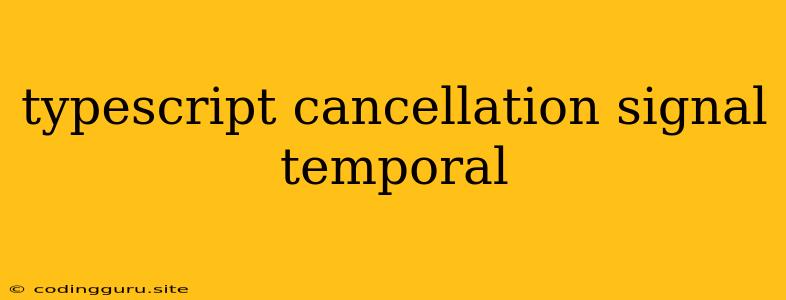Managing Asynchronous Operations with Cancellation Signals in TypeScript: A Temporal Approach
In the realm of asynchronous programming in TypeScript, managing long-running operations can pose significant challenges. One common problem is how to gracefully cancel tasks that are no longer needed, especially when they involve time-consuming processes. This is where the concept of cancellation signals comes into play, providing a mechanism to control and terminate these operations.
Cancellation signals are powerful tools in TypeScript for managing asynchronous operations, offering a robust way to handle cancellation requests. They are particularly useful when dealing with long-running tasks, preventing resource exhaustion and ensuring efficient code execution.
Understanding Cancellation Signals and Their Purpose
Cancellation signals represent a mechanism to communicate a request to stop an ongoing asynchronous operation. They function like flags or signals, conveying the intent to cancel the operation, allowing the executing code to react accordingly. This is especially important when dealing with tasks that might be running for an extended period, such as network requests, file processing, or complex calculations.
Why Temporal is a Perfect Fit for Cancellation Signals
Temporal, a framework for building reliable and robust workflows, offers a seamless integration with cancellation signals. It provides an intuitive way to define and manage cancellation requests within the context of your asynchronous workflows.
Here's why Temporal is a great fit for working with cancellation signals:
- Clear Cancellation Semantics: Temporal defines explicit cancellation logic, ensuring that operations are stopped in a controlled and predictable manner.
- Workflow Management: Temporal's workflow management features allow you to easily integrate cancellation signals into your asynchronous operations, facilitating cancellation at any stage.
- Robust Error Handling: Temporal's error handling mechanisms ensure that even in the presence of cancellation requests, your workflows remain resilient and stable.
- Simplifying Complex Workflows: Temporal simplifies complex workflows by providing a high-level abstraction over asynchronous operations, including cancellation.
How to Implement Cancellation Signals with Temporal in TypeScript
Here's a simplified example illustrating the integration of cancellation signals with Temporal in TypeScript:
import { Workflow, WorkflowClient } from "@temporalio/client";
// Define your workflow with cancellation logic
@Workflow({
cancellationType: "custom", // Indicate custom cancellation logic
})
export class MyWorkflow {
async execute(): Promise {
const cancellationToken = await this.getCancellationToken(); // Obtain the cancellation token
// Perform long-running operations
while (!cancellationToken.isCancelled()) {
// Process data
await new Promise((resolve) => setTimeout(resolve, 1000));
}
// Cleanup or perform final actions
console.log("Workflow successfully cancelled");
}
}
// Start the workflow and set a timeout for cancellation
const client = new WorkflowClient();
const handle = await client.start(MyWorkflow);
// Cancel after 5 seconds
setTimeout(() => client.cancel(handle), 5000);
In this example, we define a MyWorkflow with a cancellationType of "custom," signaling Temporal to use custom cancellation logic. The workflow retrieves a cancellationToken and uses its isCancelled() method to check if cancellation is requested. If cancellation is detected, the workflow exits gracefully.
Real-World Examples
Imagine a scenario where you need to download a large file from a server. Using cancellation signals with Temporal allows you to stop the download process if the user cancels the operation or if a network issue arises. Temporal's robust cancellation mechanisms ensure that your workflow handles the situation gracefully.
Another example involves a complex data processing pipeline. Cancellation signals enable you to halt the pipeline at any stage if a user cancels the operation or if an error occurs in a specific processing step.
Benefits of Using Cancellation Signals
- Enhanced Control: You gain finer control over the execution of asynchronous operations, allowing you to terminate them when necessary.
- Resource Management: Cancellation signals help you avoid resource exhaustion by promptly halting unnecessary operations.
- Improved User Experience: Cancellation signals empower users to stop operations that are no longer needed, leading to a more responsive and user-friendly experience.
- Error Prevention: Cancellation signals contribute to robust error handling by providing a mechanism to exit gracefully from long-running operations.
Conclusion
Cancellation signals are an invaluable tool in TypeScript, especially when dealing with asynchronous operations. Temporal's integration with cancellation signals provides a robust and convenient way to manage cancellation requests within your workflows. By embracing Temporal's features, you can ensure that your asynchronous operations remain responsive, efficient, and user-friendly.
